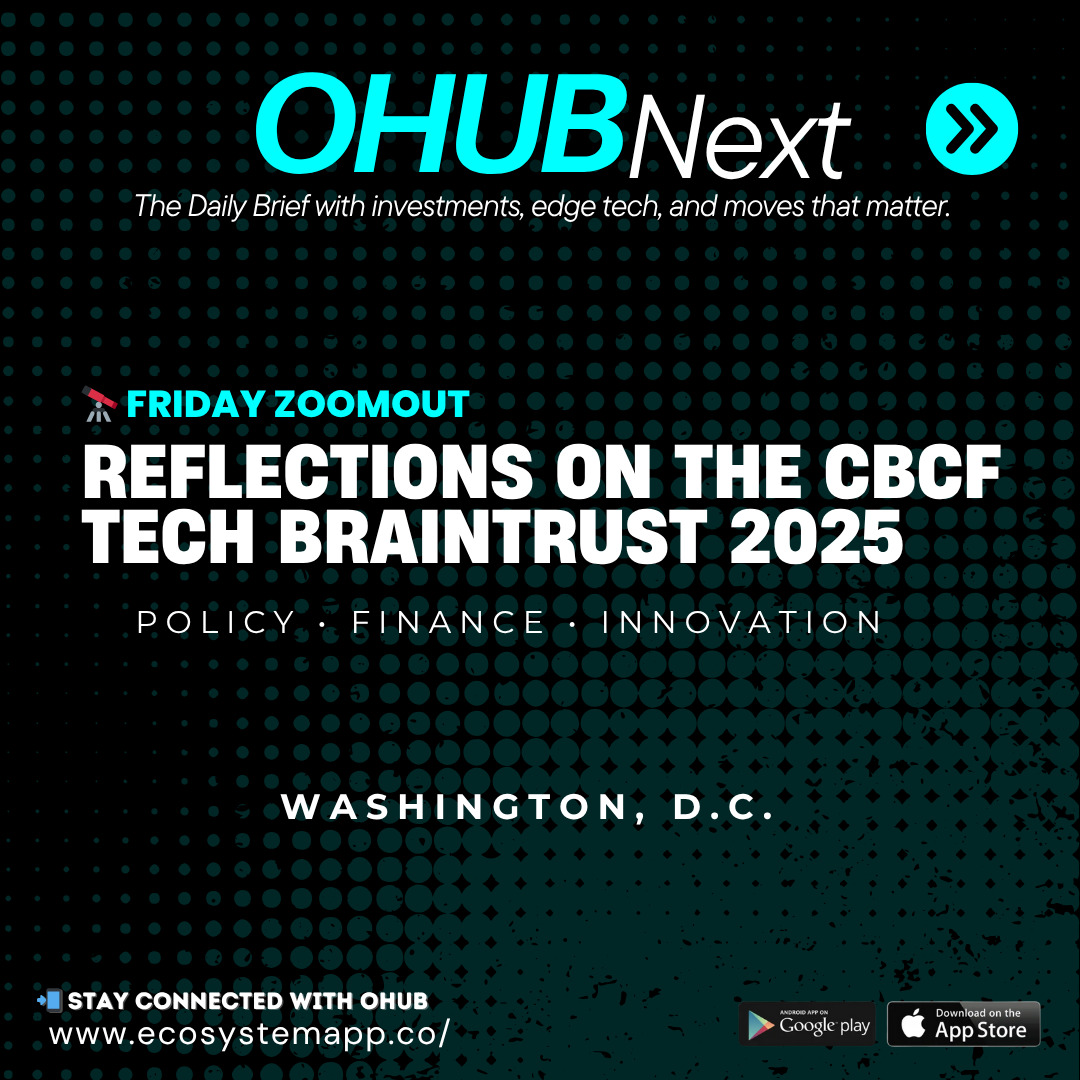
OHUB @ohub
🚨 OHUBNext | 🔭 Friday ZoomOut — Reflections on the CBCF Tech Braintrust 2025
🚨 OHUBNext | 🔭 Friday ZoomOut — Reflections on the CBCF Tech Braintrust 2025
Happy Friday, Builders!
The future isn’t waiting — and neither are we.
Just last week in Washington, D.C., the Congressional Black Caucus Foundation (CBCF) Tech Braintrust 2025 brought together leaders at the intersection of policy, finance, and innovation. OHUB was in the room, represented by Kieran Blanks, Chief Product Officer and Head of New Ventures, alongside Rep. Steven Horsford (D-NV), Chair of the CBC, and Rep. Emanuel Cleaver II (D-MO), a long-standing voice for economic equity, as well as executives from Affirm, Zest AI, Andreessen Horowitz’s a16z crypto, and the Joint Center for Political and Economic Studies.
What followed was not a distant or vague conversation about innovation. It was a reckoning with the tension at the heart of our time — the race between technological advancement, the blue-collar workforce, and the communities already most vulnerable to disruption.
⸻
💳 Finance as Fault Line
The discussion began with money, where inequities run deepest. Brittany Koné of Affirm explained how transparent lending tools can put hundreds of dollars back into families’ pockets by eliminating predatory fees and high-interest traps. For households living on the edge, that margin is the difference between falling behind and moving ahead.
Esther Kahng of Zest AI went further, challenging the foundations of credit scoring itself. Traditional FICO models penalize vulnerable populations with data points such as medical debt. Zest AI takes a different path, excluding those indicators and building models that measure risk more accurately while expanding inclusion.
This part of the conversation zeroed in on how artificial intelligence, when designed with transparency and accountability, can overturn systemic barriers. Rather than reinforcing old inequities, AI offers a chance to rewrite them — and in doing so, reshape the financial landscape.
⸻
🌐 From Web2 to What’s Next
Chris Lyons, President of Web3 Media at a16z crypto, described the turning point already underway. Web 2.0 — the era of centralized platforms built on data extraction — is reaching its ceiling. In its place, Web3 is emerging, decentralized and community-driven, with ownership built into its architecture.
As a16z research frames it, blockchains are fast becoming the “new settlement and ownership layer” of the internet. The message is direct. Those who adapt early will shape the foundations of the next economy. Those who hesitate risk paying rent in systems owned by others.
The open question is whether this new infrastructure will open pathways to shared wealth, or simply reproduce the same inequities on a different layer of code.
⸻
🏛 Policy as Imperative
Eric Morisette of the Joint Center for Political and Economic Studies, and former head of the Minority Business Development Agency (MBDA), reminded the room that procurement and public investment are not details. They determine who wins contracts, who builds infrastructure, and who benefits from billions in spending.
The MBDA alone has helped minority-owned businesses secure more than $6 billion annually in contracts and capital. That scale shows why representation matters. A seat at the table is not symbolic. It is structural power.
⸻
⚡ The Urgency of Now
Kieran Blanks, representing OHUB, made the stakes plain. For the first time in history, technology is moving faster than our institutions, our policies, and even our capacity to adapt. Entire companies are already being built by superintelligent agents that mimic judgment, language, and emotion.
McKinsey estimates generative AI could create $4.4 trillion in annual value while displacing hundreds of millions of jobs. Without intervention, Black and underestimated communities risk being locked out of the fastest wealth cycle since the Industrial Revolution.
As Kieran noted, the challenge is not simply preparing people for the future. The imperative is to shift communities from the consumption side of technology — where they are overrepresented as users — to the production side, where they can build, own, and shape the very systems their data and labor sustain.
“This,” Kieran said, “is where the shift begins.”
⸻
🗣️ Closing Thought
The call in that room was both loud and clear. We must meet this moment with the courage, discipline, and imagination it demands. We must build with the same muster and grit that generations before us used to claim freedom, dignity, and a stake in the American dream. Because if we do not, the tools that promise liberation will become instruments of exclusion. And if we do, they can become the foundation of the next great chapter in our economic story.
OHUB extends deep gratitude to Representative Steven Horsford and Representative Emanuel Cleaver II for convening this dialogue at the CBCF Tech Braintrust 2025. Their leadership affirms that equity and inclusion are not peripheral concerns. They are central to America’s competitiveness, to the strength of our democracy, and to the promise of shared prosperity.
So the charge is before us. Will we remain consumers in systems built by others, or will we become the architects of a future we truly own? The answer, as always, is up to us.
⸻
🔭 ZoomOut
We invite readers to reflect. What does ownership look like in your world? How are you moving from consumer to creator, from participant to owner, in the next economy?
⸻
⚡️ OHUBNext Daily Brief — investments, edge tech, and moves that matter.
For more than 12 years, OHUB has built pathways and on-ramps to multi-generational wealth—without reliance on pre-existing wealth. Through exposure, skills, entrepreneurship, capital markets, and inclusive ecosystems, we have helped people create new jobs, new companies, and new wealth.
